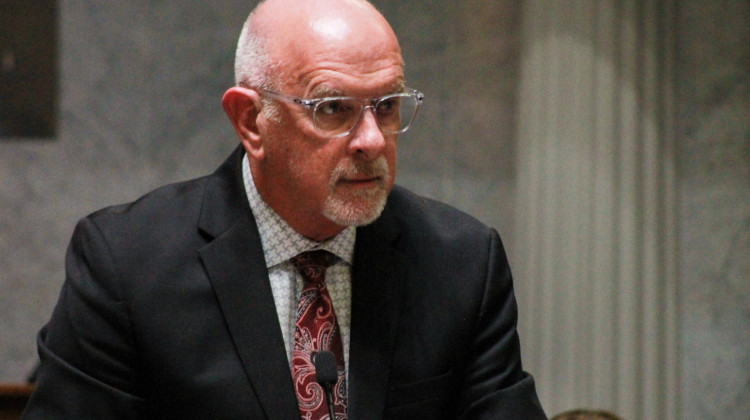
Indiana Solicitor General Thomas Fisher speaks to reporters outside the Monroe County Court building after a hearing on the first lawsuit challenging Indiana's near-total abortion ban on Sept. 19, 2022.
Brandon Smith/IPB NewsDoes the Indiana Constitution protect the right to abortion? That’s the fundamental question being asked in state court as health care providers seek to halt the state’s near-total abortion ban.
One of the lawsuits challenging the ban had its first hearing Monday.
The ban, SEA 1 (ss), outlaws abortions with three limited exceptions. Abortions are allowed when the life or serious health of the pregnant person is at risk. The procedures are also allowed for lethal fetal anomalies, when the fetus can’t survive outside of the womb – but only up to 20 weeks. And in cases of rape or incest, abortion is legal – but only up to 10 weeks.
The ACLU of Indiana filed a lawsuit on behalf of Planned Parenthood Great Northwest, Hawai‘i, Alaska, Indiana, Kentucky; Whole Woman’s Health Alliance, Women's Med Group Professional Corporation, and All-Options Pregnancy Resource Center, the state's primary providers of abortion care before the ban. The suit seeks to strike down the ban, returning the law to what it was before the ban took effect.
The judge asked the attorneys three questions before they started: Could the legislature ban abortions even for victims of rape and incest? Could the legislature ban access to contraceptives? And if the court strikes down the ban, it is usurping the role of the legislature?
Indiana Solicitor General Thomas Fisher said very clearly the legislature could ban all abortions, without exception. As for contraceptives, he would say only that’s “a different question.”
“We always have to ask – what is the legitimate purpose of the legislation, no matter what we’re talking about?" Fisher said. "And with abortion, it’s clear: the purpose of the legislation, which is not only legitimate but compelling, is to save human lives, to save the lives of the unborn.”
ACLU of Indiana Legal Director Ken Falk said striking down the law isn’t usurping the legislature’s power – it’s acknowledging that the legislature has gone too far.
“Women have a right to privacy that includes abortion rights and the legislature has taken a very fundamental, important right away from Hoosier women,” Falk said.
The judge did not indicate a timetable for her ruling, but said she hopes to issue a decision “expeditiously.”
There is a second lawsuit challenging the ban, also led by the ACLU of Indiana. That suit argues the law illegally infringes on some Hoosiers' religious beliefs. A hearing in that case is set for Oct. 14.
Contact reporter Brandon at bsmith@ipbs.org or follow him on Twitter at @brandonjsmith5.
 DONATE
DONATE






 Support WFYI. We can't do it without you.
Support WFYI. We can't do it without you.